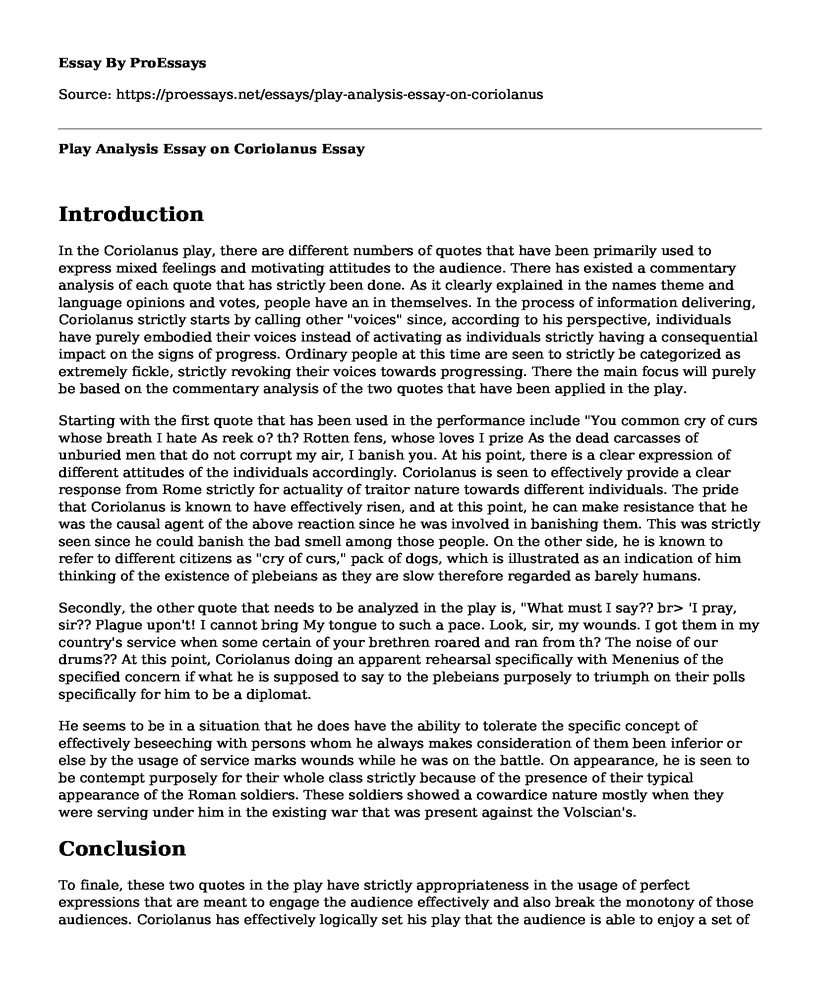Introduction
In the Coriolanus play, there are different numbers of quotes that have been primarily used to express mixed feelings and motivating attitudes to the audience. There has existed a commentary analysis of each quote that has strictly been done. As it clearly explained in the names theme and language opinions and votes, people have an in themselves. In the process of information delivering, Coriolanus strictly starts by calling other "voices" since, according to his perspective, individuals have purely embodied their voices instead of activating as individuals strictly having a consequential impact on the signs of progress. Ordinary people at this time are seen to strictly be categorized as extremely fickle, strictly revoking their voices towards progressing. There the main focus will purely be based on the commentary analysis of the two quotes that have been applied in the play.
Starting with the first quote that has been used in the performance include "You common cry of curs whose breath I hate As reek o? th? Rotten fens, whose loves I prize As the dead carcasses of unburied men that do not corrupt my air, I banish you. At his point, there is a clear expression of different attitudes of the individuals accordingly. Coriolanus is seen to effectively provide a clear response from Rome strictly for actuality of traitor nature towards different individuals. The pride that Coriolanus is known to have effectively risen, and at this point, he can make resistance that he was the causal agent of the above reaction since he was involved in banishing them. This was strictly seen since he could banish the bad smell among those people. On the other side, he is known to refer to different citizens as "cry of curs," pack of dogs, which is illustrated as an indication of him thinking of the existence of plebeians as they are slow therefore regarded as barely humans.
Secondly, the other quote that needs to be analyzed in the play is, "What must I say?? br> 'I pray, sir?? Plague upon't! I cannot bring My tongue to such a pace. Look, sir, my wounds. I got them in my country's service when some certain of your brethren roared and ran from th? The noise of our drums?? At this point, Coriolanus doing an apparent rehearsal specifically with Menenius of the specified concern if what he is supposed to say to the plebeians purposely to triumph on their polls specifically for him to be a diplomat.
He seems to be in a situation that he does have the ability to tolerate the specific concept of effectively beseeching with persons whom he always makes consideration of them been inferior or else by the usage of service marks wounds while he was on the battle. On appearance, he is seen to be contempt purposely for their whole class strictly because of the presence of their typical appearance of the Roman soldiers. These soldiers showed a cowardice nature mostly when they were serving under him in the existing war that was present against the Volscian's.
Conclusion
To finale, these two quotes in the play have strictly appropriateness in the usage of perfect expressions that are meant to engage the audience effectively and also break the monotony of those audiences. Coriolanus has effectively logically set his play that the audience is able to enjoy a set of activities throughout the game strictly. Feelings and different opinions of different individuals are shown while the play is in the process considering the above two quotes.
Cite this page
Play Analysis Essay on Coriolanus. (2023, Mar 13). Retrieved from https://proessays.net/essays/play-analysis-essay-on-coriolanus
If you are the original author of this essay and no longer wish to have it published on the ProEssays website, please click below to request its removal:
- Essay on Medieval Literature - Chaucer and Boccaccio
- The Historical Importance of Olaudah Equiano's The African Narrative Essay
- Literary Analysis of "To His Coy Mistress" Essay
- The Role of Women in the Society of Beowulf Essay
- Mythology Comparison and Contrast Essay Example
- Pride and Prejudice by Jane Austen Essay Example
- Examining the Role of Religion in John Donne's Poetry Essay Example







